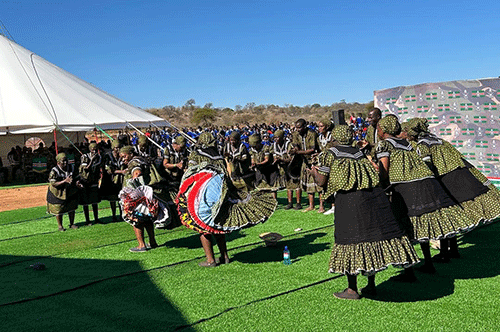Nam, Bots ties impress Kapere

Source: New Era Live
KASANE - Namibian high commissioner to Botswana Asser Kapere is impressed by the neighbours' excellent bilateral relations.
In an interview with New Era in Kasane last week, he said historically, during the colonial era when the Germans attacked Namibian people, those who fled from that genocide in Namibia went to Botswana, and found refuge there.
Notably, he applauded both governments for the authorisation of the use of national identity documents to cross their national borders without passports.
Kapere said this shows commitment to promote relations between both countries and foster social cohesion among their citizens, while enhancing regional cooperation and integration.
"This noble milestone is worth mentioning," he said.
On other bilateral relations, he touched on education, as many Namibian students have and continue to take up educational opportunities in Botswana, and vice versa.
Both countries also share the same flourishing flora and fauna, saying there is excellent collaboration in terms of a healthy population of wild animals, such as elephants.
The usage of national identity cards as documents for cross-border travel between Namibia and Botswana has been extended to Ngoma, Impalila Island and Mohembo border posts.
On the economic front, the dry port in Walvis Bay, which the Namibian government donated to Botswana in 2009 to enable that country to conduct seaborne trade, is just one example.
"The dry port in Walvis Bay is enabling imported goods into Namibia via sea, and get transported by trucks through Trans-Kalahari highway to Botswana. It's a good thing," he noted. The Botswana Dry Port, which is managed by Sea Rail Botswana, during 2022 started a journey of a facelift at its premises at the Port of Walvis Bay.
The Botswana government in 2012 appointed Sea Rail, which is a subsidiary company of Botswana Railways that operates the dry port facility at Walvis Bay.
The relationship between Botswana and Namport was birthed out of an agreement signed between the Namibian and Botswana governments through the Ministry of Works and Transport of Namibia in 2009.
The dry port offers container handling, vehicle handling and warehousing services for its clientele.
Namibia complies with the SADC Protocol, which calls for member states to work together harmoniously in achieving effective results on common problems and issues. Hence, Namibia entered into agreements with Botswana, Zambia and Zimbabwe to provide these three land-locked countries a portion of land at the Port of Walvis Bay to enable them to conduct sea-borne trade. Furthermore, Kapere, a politician-turned-diplomat, welcomed the newly-launched civil-military cooperation plan between Namibia and Botswana, which aims to educate and sensitise both communities living along the common border of the two nations on all aspects of the border.
"This is a welcome initiative to educate and train communities alongside the border to understand the dangers of crime when it comes to illegal hunting and cattle theft, or whatever it is to prevent cross-border crimes. Both countries need to fight cross-border crimes and improve the relationships between communities living alongside the borders as their families. We have families on this side of Namibia, and the side of Botswana. We share the same cultures. Therefore, they should live together in harmony and peace," he stated emphatically.
